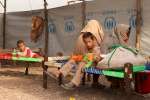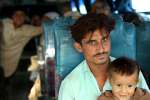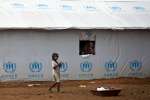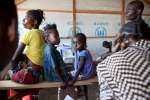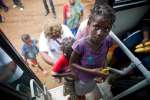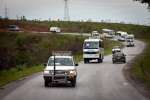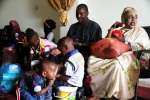- Text size
 |
|  |
|  |
| 
- Français
UNHCR helps first group of Sri Lankan refugees return by ferry from India
News Stories, 12 October 2011
COLOMBO, Sri Lanka, October 12 (UNHCR) – The UN refugee agency on Wednesday began repatriating Sri Lankan refugees from southern India by ferry, adding a new dimension to its voluntary return programme for civilians who fled the island nation before a long conflict ended in 2009.
A first group of 37 refugees (15 families) arrived by commercial ferry in Colombo on Wednesday morning after an overnight voyage from Tuticorin in the southern Indian state of Tamil Nadu. They were accompanied by three UNHCR staff.
"The start of returns by sea is significant as refugees in camps in India have been telling us they want to return by ferry so they can bring more of their household possessions home with them," said UNHCR's Representative in Sri Lanka Michael Zwack.
By the end of September, UNHCR had helped 1,493 Sri Lankan refugees (466 families) return home to the north and east. All came back by air. The returns are mainly from India (1,448) while small numbers have also come back from Malaysia, Georgia and the Caribbean island of St. Lucia. Last year, a total of 2,054 Sri Lankan refugees returned home compared to 800 the previous year.
"Refugees have been returning steadily in small and increasing numbers to Sri Lanka. It's difficult to predict how many more will opt to return with the ferry route now open. But, what is important is that if they do want to return home and bring many of their possessions they now have that opportunity," Zwack said.
All the refugees returning today have been living in some of the 112 refugee camps in Tamil Nadu, India. Among the first arrivals by ferry were some refugees returning after more than two decades in India.
UNHCR's Zwack was present at the Colombo port to welcome the returnees, along with the Minister of Economic Development Basil Rajapaksa and Deputy Minister of Resettlement Vinayagamoorthy Muralitharan.
Most refugees have been returning to the eastern district of Trincomalee, followed by Mannar, Vavuniya and Jaffna in Sri Lanka's north. Some people are also returning to the Kilinochchi, Colombo, Batticaloa, Kandy, Ampara, Matale and Puttalam areas.
"The refugees, like the tens of thousands of internally displaced people who have returned home recently, face challenges in re-establishing themselves. Earning a living and getting decent shelter are two of the things returned refugees tell us are their greatest concerns," Zwack said.
Sri Lankan refugees returning under UNHCR's voluntary repatriation programme receive a standard reintegration grant as a first step towards helping them restart their lives. Once at their destination in Sri Lanka, these returnees can approach one of UNHCR's five offices in the north and east to obtain a kit of basic household supplies.
UNHCR carries out regular monitoring and seeks to ensure that returnees receive landmine awareness classes and are included in the food ration lists and become considered as beneficiaries of government, UN and other projects under way to rebuild the lives of Sri Lankans in the north and east of the country.
In addition, UNHCR refers people with special needs to specialized institutions and those in need of legal counselling to the relevant government authority or other organizations that can provide targeted assistance.
Sri Lankan refugees abroad who wish to return home can approach the closest UNHCR office for assistance in their country of asylum.
UNHCR's most recent statistics, gathered from governments, show that at the end of 2010 there were some 140,000 Sri Lankan refugees in 65 countries, with a majority – almost 70,000 in 112 refugee camps and another 32,000 living outside camps in Tamil Nadu. The other main countries with Sri Lankan refugees are France, Canada, Germany, United Kingdom, Switzerland, Australia, Malaysia, the United States and Italy.



